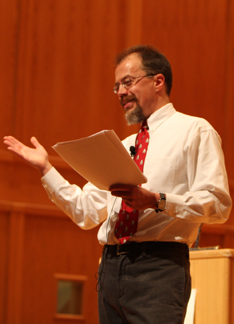Professor J.D. Phillips believes mathematics is not only beautiful, but central to a liberal arts education.
And true to the mathematician he is, Phillips has proof.
 Returning to campus from his sabbatical research in the Czech Republic, Phillips presented that proof Friday in Salter Hall as he delivered the 28th LaFollette Lecture in the Humanities, "On Self-Delusion and Unimaginable Beauty: A Mathematician’s Reveries from the Margins."
Returning to campus from his sabbatical research in the Czech Republic, Phillips presented that proof Friday in Salter Hall as he delivered the 28th LaFollette Lecture in the Humanities, "On Self-Delusion and Unimaginable Beauty: A Mathematician’s Reveries from the Margins."
"Like most mathematicians, nearly all my motivation for doing mathematics is its beauty," Phillips said. "But it’s hard to describe beauty, especially when it’s mathematics. [Attempting to do so,] we mathematicians are usually reduced to awkward analogies and metaphors."
So try this for an unexpected metaphor: The beauty of mathematics is like Kirk Gibson in the 1988 World Series.
"Young men play sports for a number of reasons…but it’s much simpler for us old men," Phillips said. "We watch sport because it is beautiful."
"There is a kind of physical beauty attendant to sport…But this is mere preamble compared to where the deepest, most penetrating beauty in sport lies."
That beauty, Phillips said, occurs when moments of creativity emerge within the constraints of strict rules.
Enter Los Angeles Dodgers outfielder Kirk Gibson and one of most memorable and oft-replayed moments in baseball history. Bound not only by the strict rules of the game, but also by a serious injury and the fact that he was facing Dennis Eckersly, the best relief pitcher of his day, Gibson steps to the plate in the bottom of the ninth inning with his team down one run.
"Grimacing in agony with each swing, he somehow masters his pain and creates a moment of effortless beauty as his smooth-as-silk swing takes the final pitch over the right field wall for a game-winning home run, his legs so injured they can barely carry him around the bases," Phillips said. "A lean beauty that results from the most creative of acts, which emerge on a level playing field in a rigid, rule-bound universe, is common to both mathematics and sport."
"There is, I think, a deep sadness that anchors our yearning for beauty in ways that we’re often not aware of," Phillips added. "But an encounter with the beautiful can be an occasion for opening oneself up to the possibility of self-purification.
Sometimes encountering the beautiful, in baseball or mathematics, Phillips said, "can make you want to be a better man or woman."
But perhaps an even stronger contribution of mathematics to liberal education is its ability to "train us in argument."
"As childish and tyrannical as devotion to argument often is, properly wielded…it can also alert you to absurdity by focusing your attention on the unsavory conclusions that can be drawn from faulty premises, premises that otherwise might seem irresistibly seductive," Phillips said. "Argument can liberate you from the oppressive tyranny of foolishness. This is one of the chief reasons that mathematical training in argument plays such a central role in liberal education."
Such training, together with a deep curiosity and developing expertise in a particular discipline, can lead to one of the central aims of liberal education—developing the capacity for judgment.
"The world is indifferent, sometimes even hostile to arguments," Phillips lamented. "Instead, it draws lines in the sand and demands fealty to the "right" side, keep your arguments to yourself, thank you very much.
"But I prove theorems, in a decadent and philosophically problematic garden of aesthetic delights. I make arguments," Phillips said. "Do you know what the world oftentimes feels like to us mathematicians? It feels shrill and uber-earnest; often even tyrannical and oppressive."
Concluding his lecture, Phillips offered an antidote to a "shrill and uber-earnest" world, an antidote he’s learning from his Czech colleagues at Charles University in Prague. Most of those teachers were in Prague during the years of the Soviet Union and had to develop "some rather creative ways to navigate through the absurd, and often treacherous, political waters they found themselves in.
"One of the ways my Czech colleagues tell me they did this was with humor, usually in the form of archly subversive jokes," Phillips said, sharing several of those anecdotes.
Then Phillips turned that sense of humor on his own discipline’s penchant for proofs.
"I have a research colleague who has a Mr. Spock-like algorithm describing the perfect wife he hopes to someday meet," said Phillips. "He carries it with him in his wallet.
"Need I tell you, he’s still a bachelor? A 48-year-old bachelor."